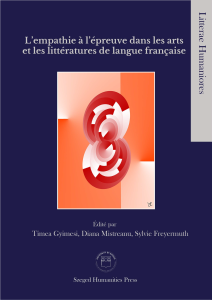L’empathie à l’épreuve dans les arts et les littératures de langue française
Keywords:
visual art, narrative empathy, Einfühlung, affective and ethical turn in literature, aesthetics and empathy, pseudo-empathy, theory of mind, care theorySynopsis
Responding to the urgent need for new critical frameworks in an era of systemic crises, this volume makes a compelling case for empathy as a vital epistemological tool. The collection, which gathers twenty-four international scholars, re-energizes the study of French-language arts and literatures by connecting the philosophical legacy of Husserl and Lipps to the contemporary affective turn. While essays meticulously analyze the technical construction of narrative empathy, the book’s core provocation is its powerful synthesis of empathy with theories, notions and approaches such as pragmatism, attention theory, or the concept of milieu. This innovative theoretical alignment transforms empathy from a mere feeling into a rigorous method for critical inquiry. Ultimately, this volume does not simply examine the nexus between empathy and fiction; it enacts an empathetic scholarship, offering a powerful, nuanced approach to understanding our complex contemporary world.
Chapters
-
IntroductionÀ l’épreuve de l’empathie
-
Le tournant affectif des études littéraires
-
Quelle voix, quel peuple ?Empathie et aventure conceptuelle dans La Mer à l’envers de Marie Darrieussecq
-
Empathie narrative, autothéorie et énactivisme chez Virginia Pesemapeo Bordeleau et Didier Eribon
-
Deux siècles de sollicitudereprésentations de la servitude féminine d’Un Coeur simple à l’éthique du care
-
« Vivre par procuration »recyclage et empathie dans Les Larmes d’Olivia Rosenthal
-
L’empathie à l’oeuvre dans la photographie et la photolittérature
-
Fictions et lectures empathiques dans l’oeuvre fantomatique de Sophie Calle
-
La peinture et la musique comme moyens pour réveiller l’empathie dans l’oeuvre de Wajdi Mouawad
-
L’empathie pour les jeunes femmes rebelles dans Mais ne nous délivrez pas du mal (Joël Séria, 1971) et Le Bal des folles (Mélanie Laurent, 2021)
-
Entre imaginaire et empathieune analyse des dessins de Boris Taslitzky
-
Empathie et Instauration de l’oeuvre à faireSouriau et le design
-
L’homo diligens, archétype du visiteur du Poïpoïdrome (Robert Filliou et Joachim Pfeufer) et d’un être empathique
-
De l’empathie représentée à l’empathie suscitée : deux fonctionnements en régimes romanesque et poétiqueLes écritures de Jean Rouaud et de Simon-Gabriel Bonnot
-
Limites de l’empathieLe cas du Fou d’Omar d’Abla Farhoud
-
Du subversif à l’empathie grâce au fragnol de Pas pleurer (L. Salvayre) et à son « imaginaire hétérolingue »
-
Penser des empathies de la forme avec le cycle Soifs de Marie-Claire Blais
-
L’empathie a-t-elle un style ?Le cas de D’autres vies que la mienne d’Emmanuel Carrère
-
Récit d’empathie et (re)construction identitaire dans La Théo des fleuves de Jean Marc Turine
-
L’empathie, émotion de la construction de soi et de l’engagement politiqueLola Lafon, Mercy, Mary, Patty
-
Deuil et empathieDe la collaboration à la tension narrative dans le récit français contemporain
-
L’empathie narrative dans Allah n’est pas obligé d’Ahmadou Kouroumales oraisons funèbres de Birahima
-
Pour une poétique empathique chez Éric-Emmanuel Schmittempathie imaginative et intertextuelle
-
L’empathie à l’oeuvre d’un texte à l’autre
-
Empathie narrative et les oubliés de la sociétéIllégitimes (2021) de Nesrine Slaoui, Ajar-Paris (2022) de Fanta Dramé et Streulicht (2020) de Deniz Ohde
-
Être au monde : poésie et empathie


